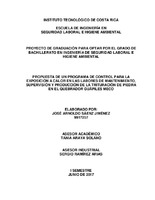Propuesta de un programa de control para la exposición a calor en las labores de mantenimiento, supervisión y producción de la trituración de piedra en el Quebrador Guápiles Meco
Abstract
This project was developed in the Strategic Business Unit of Aggregates of Constructora MECO, specifically in the crushing plants in Guápiles. The research was carried out in the maintenance workshop and in the primary and secondary stone crushing areas, where daytime workers are exposed to thermal stress. There is a maximum of fifteen workers in these areas.
The discomfort expressed by the workers regarding the thermo-hygrometric conditions present in their work areas have remained constant for several years, and have resulted in employees’ failure to comply with the company's safety regulations due to the feelings of suffocation experienced. Similarly, the work performance is affected when the environmental temperature increases and workers start showing symptoms of fatigue.
The main risk factors of occupational exposure to heat in these work areas are the climatic conditions of the Atlantic Zone (tropical rainy climate), the postural load, and the metabolic rate of the worker when performing his tasks.
The methodology used in this paper includes data collection instruments such as surveys and interviews, in addition to direct-reading measurement tools such as weighing scales, stopwatches, oximeters, TGBH meter and anemometers. The data obtained was analyzed and interpreted using methods, international standards and programs to evaluate occupational exposure to heat.
The staff exhibited symptoms of exposure to thermal stress, such as fatigue and muscle pain, which may be influenced by dehydration and increased internal body temperature.
The measured heat exposure rates showed that there is thermal stress in the work areas and high level of danger for the personnel.
Therefore, it’s necessary to implement the Occupational Exposure to Heat Control Program in the intervention of thermo-hygrometric variables that affect the thermal equilibrium of the workers in the stone crushing plants. This program includes engineering and administrative controls that aim to minimize thermal stress and avoid adverse effects on workers' health.
Description
Proyecto de Graduación (Bachillerato en Ingeniería en Seguridad Laboral e Higiene Ambiental) Instituto Tecnológico de Costa Rica, Escuela de Ingeniería en Seguridad Laboral e Higiene Ambiental, 2017.


